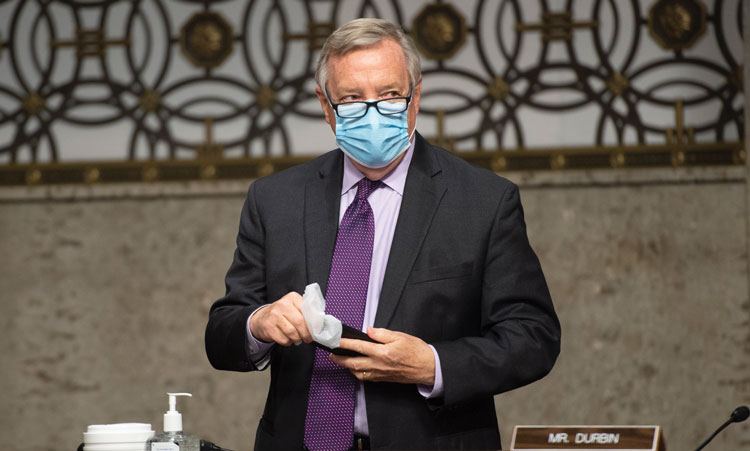Congress battles over liability shields for businesses during the COVID-19 pandemic

Sen. Dick Durbin (D-Ill.) was opposed to legislation protecting businesses from COVID-19-related tort liablilty at a May Senate Judiciary Committee hearing on the subject. Photo by Caroline Brehman-Pool/Getty Images
Just as the number of COVID-19-related deaths, job losses and small business closures has continued to climb in the United States, so has the number of coronavirus-related lawsuits. By early May, the ABA Journal reported that nearly 800 lawsuits had been filed related to COVID-19; by July 1, that number had grown to more than 3,100, according to an online tracker developed by Hunton Andrews Kurth. These lawsuits have led some states to grant varying degrees of liability immunity to certain businesses, and Senate Majority Leader Mitch McConnell (R-Ky.) has pushed to provide federal liability protections as well.
Legislators are debating whether or not Congress should enact legislation that will protect businesses and other organizations from COVID-19-related tort liability.
While some policymakers assert liability protections are necessary to help reopen the economy without fear of litigation, others claim such provisions would remove incentives for businesses to protect their employees and the public and eliminate accountability.
Tort law is largely a state responsibility, but Congress has enacted legislation that shields certain entities from tort liability. For example, Section 3215 of the Coronavirus Aid, Relief and Economic Security Act protects health care professionals from liability for acts or omissions they commit while performing volunteer health care services during the COVID-19 emergency.
On May 12, the Senate Judiciary Committee held a hearing titled “Examining Liability During the COVID-19 Pandemic.” The witnesses were a diverse cross section of stakeholders representing small business, organized labor, employee rights advocates, colleges and universities, and a local tourism bureau as well as a law professor.
During the hearing, committee Chairman Lindsey Graham (R-S.C.), ranking member Dianne Feinstein (D-Calif.), and all the witnesses agreed that more guidance was needed from the Occupational Safety and Health Administration to safely reopen the nation.
“The sooner we can come up with a regulatory, OSHA-driven process to allow big, small and intermediate businesses [guidance], the better off we’ll be,” Graham said. Feinstein concurred, adding that it’s critical for the federal government to issue coronavirus-related standards for workplaces.
Divided opinion
Although there was broad agreement on the need for OSHA guidelines, the witnesses disagreed on the need for a liability shield. In a reflection of the ideological divide in Congress on the issue, the witnesses representing small business, colleges and a local tourism bureau called for strong temporary liability protections to shield their constituencies from unfair lawsuits. In contrast, the law professor and the union and employee rights witnesses warned that such protections were not needed and would harm workers and the public.
McConnell on the day of the hearing announced he was developing a bill with Sen. John Cornyn (R-Texas) to prevent “a second epidemic of frivolous lawsuits” by creating “a legal safe harbor for businesses, nonprofits, governments, workers and schools who are following public health guidelines to the best of their ability.” However, the bill would not provide immunity for “actual gross negligence and intentional misconduct.”
During the hearing, Sen. Dick Durbin (D-Ill.) disagreed with McConnell’s assertion that a tidal wave of coronavirus-related lawsuits would inundate the legal system if liability shields were not enacted. Durbin also claimed that of the suits filed to that point, only 27 were for personal injury and nine were for medical malpractice. The bulk of the lawsuits, he added, centered around prison conditions and insurance coverage disputes.
Other congressional Democrats also have pushed back hard against Republican proposals to include business immunity in any stimulus package.
“We believe that the requirements that are in place to protect consumers and patients and others are there for a reason,” House Majority Leader Steny Hoyer (D-Md.) said on May 12. “Undermining those protections is not somewhere we would want to go.”
The ABA has not taken a position on federal proposals to limit COVID-19 liability but previously has urged Congress to be specific when enacting legislation to preempt state tort laws. The ABA will continue to monitor these developments and comment as appropriate.
This report is written by the ABA’s Governmental Affairs Office and discusses advocacy efforts by the ABA relating to issues being addressed by Congress and the executive branch of the U.S. government. This column was originally published in the August-September 2020 issue of the ABA Journal under the headline: “Developing Immunity.”
Write a letter to the editor, share a story tip or update, or report an error.


